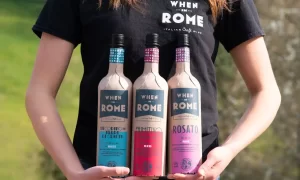The paper wine bottle is one of the biggest ideas since the screw top but as pecorino in a brown paper eco-bottle arrives at Ocado, there’s one thing to remember, try not to get it wet.
The £11 white, from the sustainable wine brand When in Rome, goes on sale this week, and is the first wine in a paper bottle to be sold in a mainstream UK supermarket. Even if the bottle does become damp, all is not lost, says Rob Malin, the company’s founder, because the wine is safe in a recyclable plastic pouch inside.
While glass bottles have been part of the wine-drinking tradition for centuries, making the material requires huge amounts of energy at a time when companies are looking for ways to reduce the carbon footprint of their products. Recycling rates for glass are also poor.
“Great wine doesn’t have to come in glass bottles,” Malin says, explaining the leap of faith he is asking wine drinkers to take. “Whether you’re drinking from a glass bottle or a paper bottle, the quality of the wine is not impacted.” However, he cautions, don’t put the paper bottle in an ice bucket. “It will go soggy. You need to use a dry chiller.”
When in Rome says: ‘Great wine doesn’t have to come in glass bottles.’ Photograph: When in Rome
The bottle, made by the sustainable packaging firm Frugalpac, is 94% recycled paper and has a carbon footprint that is about a sixth of a single-use glass bottle. At the moment it costs about the same as a glass one but the maths are moving in its favour because of soaring glass prices as well as shortages linked to higher energy costs and the war in Ukraine, where some factories have closed.
“The production of glass involves huge amounts of energy, so the cost of glass bottles is going sky-high,” said Malcolm Waugh, Frugalpac’s chief executive. “In some instances it is two to three times the price but it depends on who you are, and the type of bottle. Certainly there’s a 30 to 40% increase.”
Waugh says Frugalpac’s sales are up fivefold this year, with the firm being inundated with inquiries for the paper bottles, which can also be used for spirits and olive oil. “We’ve taken some big orders that will be coming out later this year.”
Ceri Parke, a co-owner of the Cantina Goccia winery in Umbria, agrees there is a shortage of glass and the price is going up. Her winery uses glass and paper bottles but she says: “You can’t just get the glass bottles you’re used to getting. For a bottling we did three weeks ago, I had to use a bottle that I wouldn’t normally use. The consumer probably won’t notice the difference but the other one is not available.”
When in Rome is also trying to convince Britons to try other, greener wine containers such as box wine or cans. These “alt-formats” unfairly get a “bad rap”, Malin says. “People think bag-in-box wine is crap. It’s ridiculous because most Australian wine comes here in huge bag-in-boxes.”
The paper bottle has a higher carbon footprint than its box wine but Malin says it means it can go “head to head with glass, and let the consumer decide for themselves about alt-format wines”.
